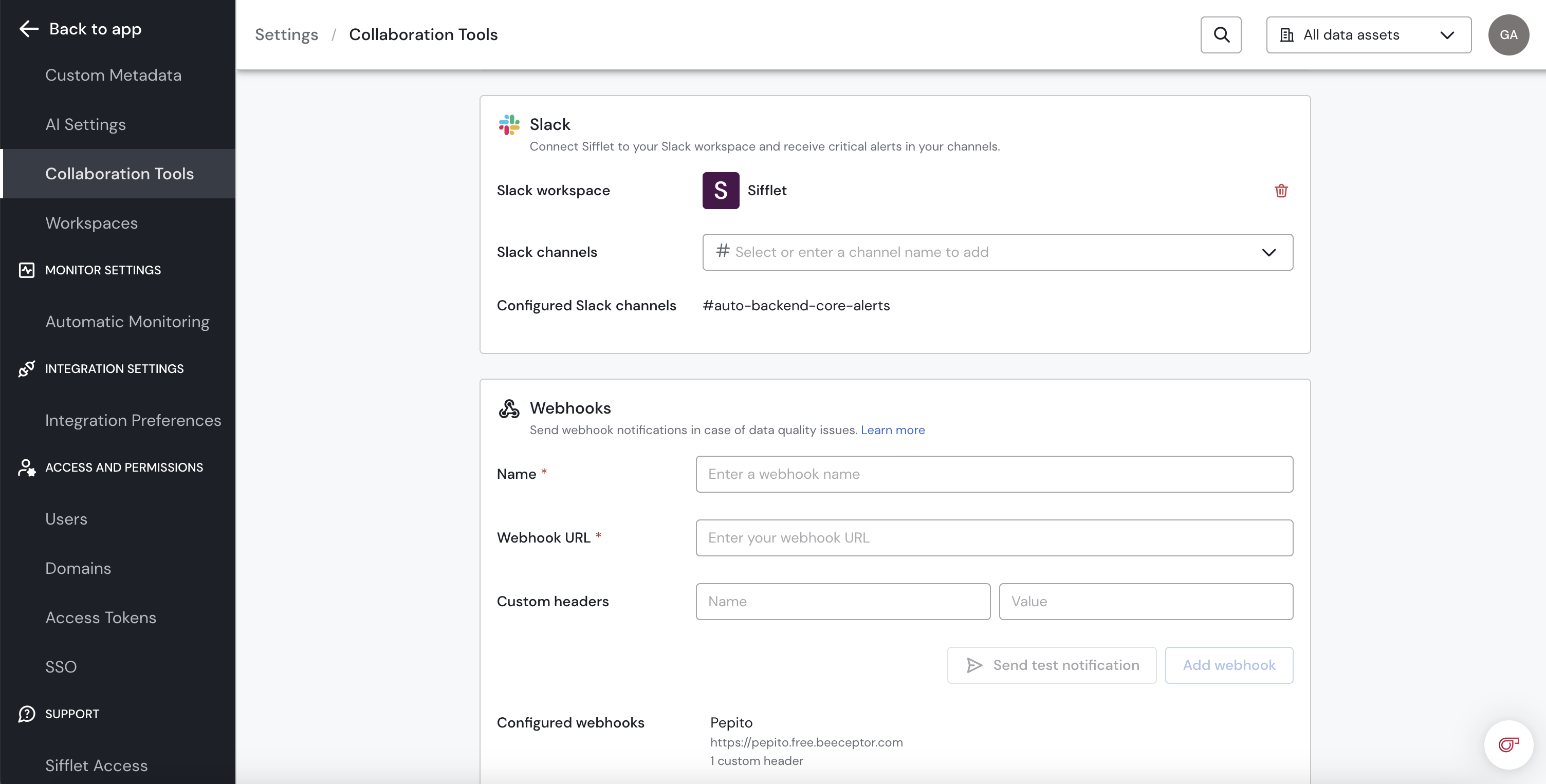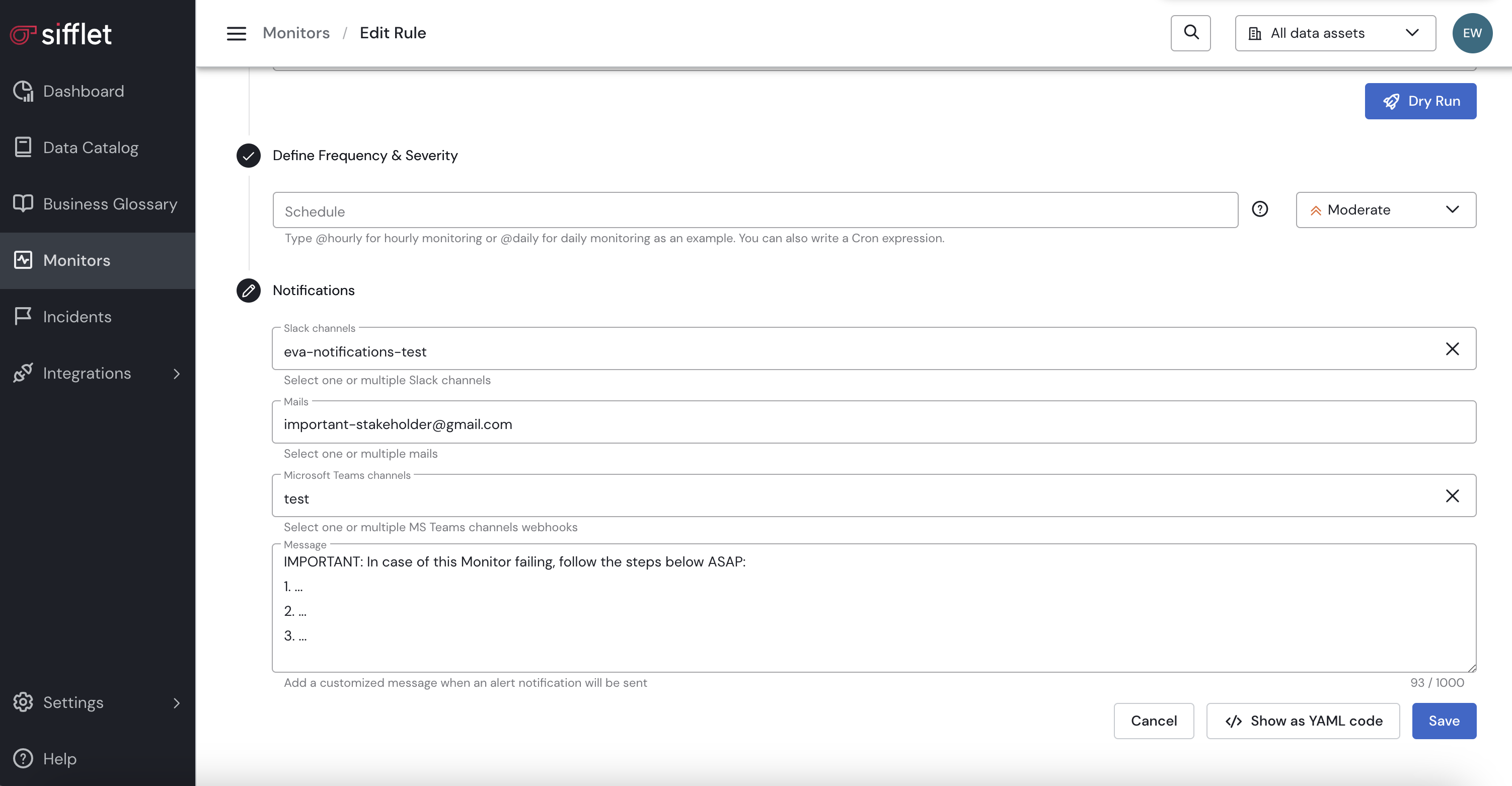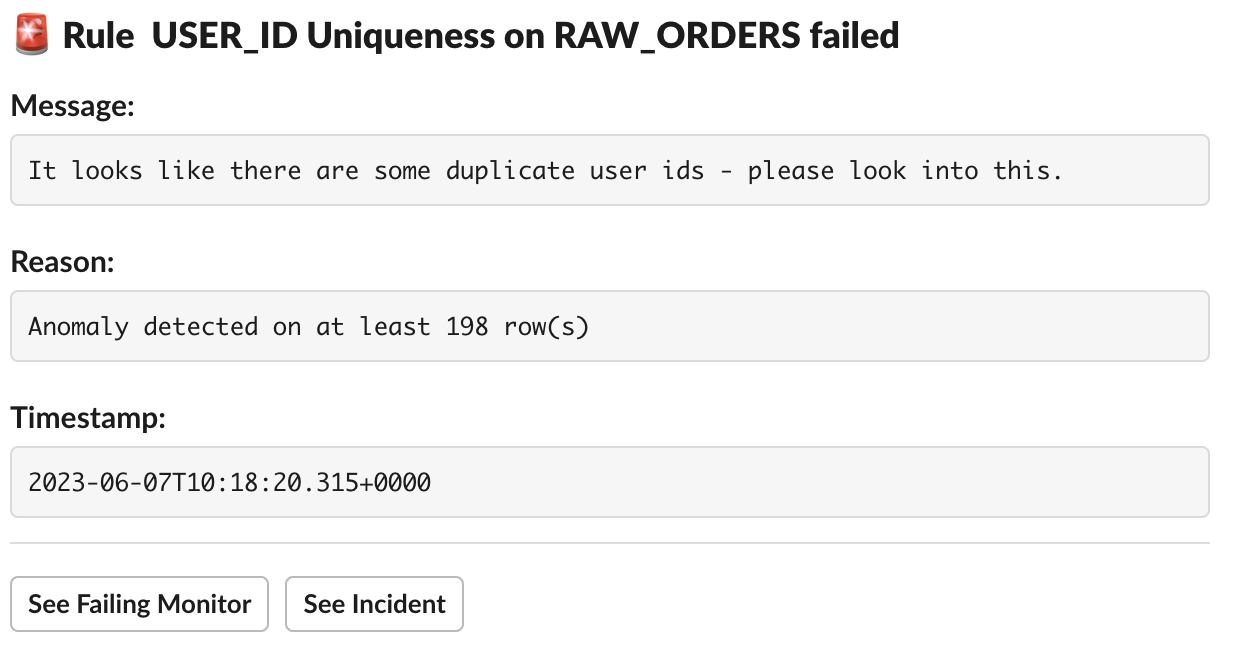Notifications
Being alerted by monitors allows you to be proactive about issues detected by Sifflet and to react before the issue impacts your teams and any decision they might be about to make. It also allows you to be alerted in case of a monitor misconfiguration to ensure that it doesn't go unnoticed and that your monitoring coverage remains intact.
Before setting notifications, make sure to setup alerting channelsBefore any Notifications may be configured, Collaboration Tools need to be connected.
How to
Setup Notifications
Overview
Notifications are messages sent through chosen communication channels when a Monitor doesn't succeed, triggering an Incident creation. A Notification's main goal are making sure the information reaches the right stakeholders as soon as possible and facilitating debugging.
Collaboration Tools
In order to be able to configure Notifications, remember to setup Collaboration Tools beforehand.

Monitor-level setup
Notifications configuration is available as the last step of a manual Monitor configuration process and it can be revisited at any time. It's possible to choose multiple Alert Channels for the same Monitor. Furthermore, it's possible to customize the Alert Message, so that it'd provide the right information to the informed stakeholders, facilitating troubleshooting or providing guidance on what should be done in case of that particular Monitor failing.

Read Notifications
Notifications are triggered if a Monitor Run doesn't succeed and instead results in one of the following Monitor Run Statuses: Failure, Requires attention, or Technical error.
Independently from a Collaboration Tools, a Notification contains the same level of information. Below is an example of a Slack Notification.

Example Notification - Slack
Title
The title of the Notification follows a syntax below:
[Alert emoji] [Monitor Name] [**on**] [Asset Name] [Monitor Run Status]
Message
The message configured in the Monitor Configuration Step. This message is "fixed" - its content is defined by the user and doesn't change depending on e.g. the Run Status.
Reason
The reason that caused the monitor to fail.
Timestamp
The time of the failed Monitor Run.
Optionally: Window of scanned data
This section reflects the Time Window Monitor setting. It shows up only if a Monitor has that parameter configured.
Links
See Failing Monitor
It redirects to Monitor Page and is normally a good starting point for troubleshooting.
See Incident
Redirects to the Incident Page to get more insights into the impact of your asset on the rest of the business.
Muting Notifications
The "Pause Notifications" feature allows you to temporarily silence alerts for a specific monitor. This is useful when you anticipate temporary or expected status changes (like during a planned maintenance window) and want to avoid unnecessary noise without risking missing the next important update.

Muting notifications
How It Works
When you pause notifications, the monitor will stop sending alerts until one of two conditions is met:
- Automatic Resumption: The monitor will automatically resume sending notifications as soon as its status changes (e.g., from
FailingtoPassing, orFailingtoNeeds Attention). This ensures you are immediately notified of the next important event. - Manual Resumption: You can manually resume notifications at any time by clicking the button again.
How to Pause Notifications
- Navigate to the monitor you wish to silence.
- Click the Pause Notifications icon (e.g., a bell symbol). The tooltip will confirm the action: "Pause notifications until next status change."
- The monitor is now paused. To resume notifications manually before a status change occurs, simply click the icon again.
Notifications Best Practices
Pick the right alerting channels
- Make sure to pick the appropriate channels depending on the severity of your monitor: if your teams are usually more reactive on Slack or MS Teams, you probably want to have your monitors with the highest severity notify over there and keep emails for the least critical monitors.
- Be mindful of single points of failure: notifying a single person over email is nice as it gives clear ownership, but you should also account for cases where the usual owner of a monitor/data asset might be out: somebody else on the team needs to be able to see the alert and react accordingly if needed.
- Notifications are not only useful to let data owners know that something needs to be fixed, they can also allow you to give visibility to data consumers about the health of upstream pipelines.
Make the alert actionable
- Ensure that your notification message includes the necessary context to facilitate troubleshooting. You can therefore include the information below in your notifications:
- Debugging guidelines
- Internal documentation links
- Etc.
As Code
Parameters
In notifications
Kind: The kind of notification hook you're setting up in the monitor:
name: The name of the collaboration channel or the email .
notifications:
- kind: Slack
name: auto-demo
- kind: Slack
name: auto-demo-slack
- kind: Email
name: [email protected]
- kind: MicrosoftTeams
name: Generalincident.message: A custom message that will be added to alerts
incident:
severity: Low
message: If this monitor fails I'll eat my shoe
createOnFailure: falseUpdated 3 months ago
